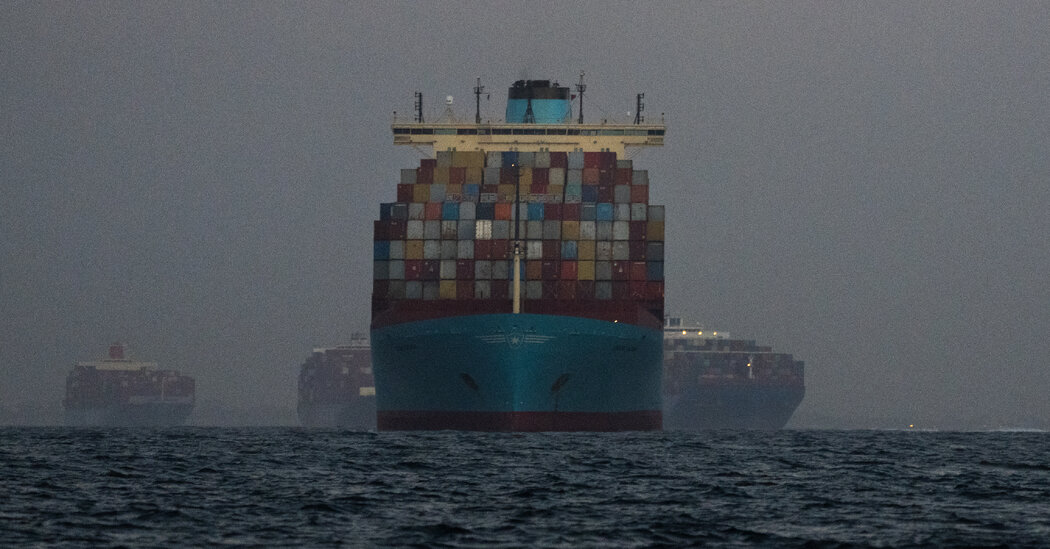
WASHINGTON — A sweeping new law aimed at cracking down on Chinese forced labor could have significant — and unanticipated — ramifications for American companies and consumers.
The law, which went into effect on Tuesday, bars products from entering the United States if they have any links to Xinjiang, the far-western region where the Chinese authorities have carried out an extensive crackdown on Uyghur Muslims and other ethnic minorities.
That could affect a wide range of products, including those using any raw materials from Xinjiang or with a connection to the type of Chinese labor and poverty alleviation programs the U.S. government has deemed coercive — even if the finished product used just a tiny amount of material from Xinjiang somewhere along its journey.
The law, called the Uyghur Forced Labor Prevention Act, presumes that all of these goods are made with forced labor, and stops them at the U.S. border, until importers can produce evidence that their supply chains do not touch on Xinjiang, or involve slavery or coercive practices.
Evan Smith, the chief executive at the supply chain technology company Altana AI, said his company calculated that roughly a million companies globally would be subject to enforcement action under the full letter of the law, out of about 10 million businesses worldwide that are buying, selling or manufacturing physical things.
“This is not like a ‘picking needles out of a haystack’ problem,” he said. “This is touching a meaningful percentage of all of the world’s everyday goods.”
The Biden administration has said it intends to fully enforce the law, which could lead the U.S. authorities to detain or turn away a significant number of imported products. Such a scenario is likely to cause headaches for companies and sow further supply chain disruptions. It could also fuel inflation, which is already running at a four-decade high, if companies are forced to seek out more expensive alternatives or consumers start to compete for scarce products.
Understand the Supply Chain Crisis
Failure to fully enforce the law is likely to prompt an outcry from Congress, which is in charge of oversight.
“The public is not prepared for what’s going to happen,” said Alan Bersin, a former commissioner of U.S. Customs and Border Protection who is now the executive chairman at Altana AI. “The impact of this on the global economy, and on the U.S. economy, is measured in the many billions of dollars, not in the millions of dollars.”
Ties between Xinjiang and a few industries, like apparel and solar, are already well recognized. The apparel industry has scrambled to find new suppliers, and solar firms have had to pause many U.S. projects while they investigated their supply chains. But trade experts say the connections between the region and global supply chains are far more expansive than just those industries.
According to Kharon, a data and analytics firm, Xinjiang produces more than 40 percent of the world’s polysilicon, a quarter of the world’s tomato paste and a fifth of global cotton. It’s also responsible for 15 percent of the world’s hops and about a tenth of global walnuts, peppers and rayon. It has 9 percent of the world’s reserves of beryllium, and is home to China’s largest wind turbine manufacturer, which is responsible for 13 percent of global output.
Direct exports to the United States from the Xinjiang region — where the Chinese authorities have detained more than a million ethnic minorities and sent many more into government-organized labor transfer programs — have fallen off drastically in the past few years. But a wide range of raw materials and components currently find their way into factories in China or in other countries, and then to the United States, trade experts say.
Alejandro N. Mayorkas, the secretary of homeland security, said in a statement on Friday that his department was “committed to ending the abhorrent practice of forced labor around the globe.”
“We must combat these inhumane and exploitative practices while ensuring that legitimate goods can enter at our ports and reach American businesses and consumers as quickly as possible,” he said.
The Chinese government disputes the presence of forced labor in Xinjiang, saying that all employment is voluntary. And it has tried to blunt the impact of foreign pressure to stop abuses in Xinjiang by passing its own anti-sanctions law, which prohibits any company or individual from helping to enforce foreign measures that are seen as discriminating against China.
Though the implications of the U.S. law remain to be seen, it could end up transforming global supply chains. Some companies, for example in apparel, have been quickly severing ties to Xinjiang. Apparel makers have been scrambling to develop other sources of organic cotton, including in South America, to replace those stocks.
But other companies, namely large multinationals, have made the calculation that the China market is too valuable to leave, corporate executives and trade groups say. Some have begun walling off their Chinese and U.S. operations, continuing to use Xinjiang materials for the China market or maintain partnerships with entities that operate there.
It’s a strategy that Richard Mojica, a lawyer at Miller & Chevalier Chartered, said “should suffice,” since the jurisdiction of U.S. customs extends just to imports, although Canada, the United Kingdom, Europe and Australia are considering their own measures. Instead of moving their operations out of China, some multinationals are investing in alternative sources of supply, and making new investments in mapping their supply chains.
How the Supply Chain Crisis Unfolded
The pandemic sparked the problem. The highly intricate and interconnected global supply chain is in upheaval. Much of the crisis can be traced to the outbreak of Covid-19, which triggered an economic slowdown, mass layoffs and a halt to production. Here’s what happened next:
At the heart of the problem is the complexity and opacity of the supply chains that run through China, the world’s largest manufacturing hub. Goods often pass through many layers of companies as they make their way from fields, mines and factories to a warehouse or a store shelf.
Most companies are well acquainted with their direct suppliers for parts or materials. But they may be less familiar with vendors that their primary supplier does business with. Some supply chains have many layers of specialized suppliers, some of whom may contract out their work to other factories.
Take carmakers, who may need to procure thousands of components, like semiconductors, aluminum, glass, engines and seat fabric. The average carmaker has about 250 tier-one suppliers but exposure to 18,000 other companies across its full supply chain, according to research by McKinsey & Company, the consultancy firm.
Adding to the complexity is reluctance by the Chinese authorities and some companies to cooperate with outside investigations into their supply chains. China tightly controls access to Xinjiang, making it impossible for outside researchers to monitor conditions on the ground, especially since the start of the coronavirus pandemic. In practice, that could make it too difficult for U.S. importers to maintain any ties to Xinjiang, since they won’t be able to verify that businesses there are free of labor violations.
Companies whose goods are detained at the U.S. border will have 30 days to give the government “clear and convincing evidence” that their products don’t violate the law. Mr. Bersin said it would likely take customs officials several years to build out a comprehensive enforcement system.
Still, the government has already started to ramp up its capacity for checking and detaining foreign goods.
John M. Foote, a partner in the international trade and practice group at Kelley Drye and Warren, said that U.S. Customs and Border Protection, which is responsible for inspecting and detaining goods at the ports, was undergoing a large expansion in staffing.
It has used $5.6 million to hire 65 new people this year for forced labor enforcement, and set aside an additional $10 million for overtime pay to handle detentions at its ports. For 2023, the White House has requested $70 million to create another 300 full-time positions, including customs officers, import specialists and trade analysts.
These amounts rival or exceed other government enforcement bureaus, such as the Office of Foreign Assets Control, which administers U.S. sanctions, and the Bureau of Industry and Security, which oversees export controls, Mr. Foote wrote in a note to clients.
Any company with a supply chain running through China has to consider the risk that its products could face scrutiny or detentions, he wrote, adding, “There is almost no company in the United States currently truly prepared for this type of enforcement.”




